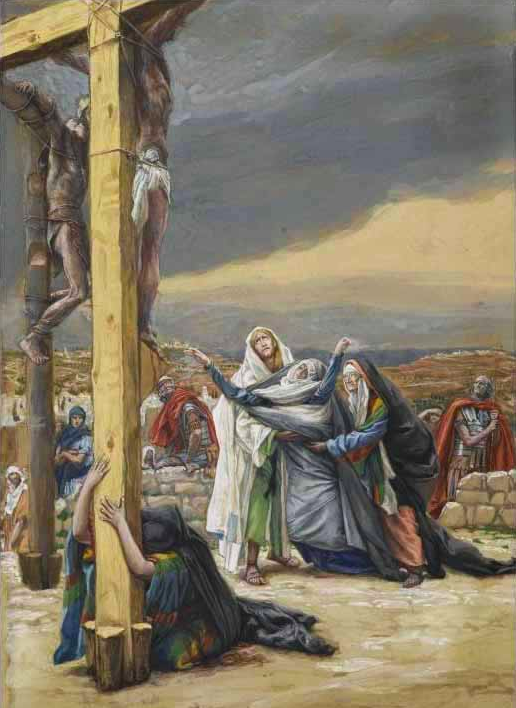Family. It’s complicated. For some, it’s a longing yet to be fulfilled—an individual longing for a spouse or a couple longing for children. For others, it evokes pain through memories of poor parenting or trauma with relatives. However positive or negative, all of our familial experiences make us long for a true and better family. In this place, we can belong to all, truly known and truly loved.
Our dying Saviour prioritises this with an extremely significant person, his very mother. As he hangs upon the cross, the situation unfolds: “When Jesus saw his mother and the disciple whom he loved standing nearby, he said to his mother, “Woman, behold, your son!” Then he said to the disciple, “Behold, your mother!” And from that hour the disciple took her to his own home” (John 19:26-17).
Mother, See to Your Son
“Woman, behold, your son!”
The words spoken here are no ordinary words of suggestion. These are words bearing the legal force of Roman law for Mary to adopt John as her own son. Jesus asks his mother to direct her love for her only virgin-born son—the promise of the Father to be the world’s Saviour bearing her flesh—fully and heartily to John.
The tender affections that Jesus experienced from his mother, the loving embrace in times of hurt, and the joy of everyday love between a mother and her son, Jesus says, are now to be directed to his friend, John. She who nursed Jesus with her tender love must now nourish John with the same love.
The sufferings of Christ do not so overwhelm him that he forgets about his friends. Rather, his suffering, which was not his own but ours that he voluntarily took upon himself, continued to place our needs before the travails of his own body and soul.
Our Saviour creates union in relationships that can go beyond even natural familial ties. He establishes the church as a family for believers and their children and imbues her with all the gifts and graces for their nourishment.
For this reason, the historic church has viewed the institutional church as a mother, united by Christ and nourished by the Father’s Spirit. As an example, John Calvin remarks that the church is “into whose bosom God is pleased to collect his children, not only that by her aid and ministry they may be nourished so long as they are babes and children, but may also be guided by her maternal care until they grow up to manhood, and, finally, attain to the perfection of faith” (Institutes 4.1.1).
Thus, our dying Lord has appointed the church as the place of intimate belonging for believers. In her bosom, we are conceived by the Word, nourished by grace, and ushered into the Father’s glorious presence.
Friend, See to Your Mother
“Behold, your mother!”
To whom would you entrust your mother as you lay dying? Perhaps your siblings or a well-off uncle to protect and provide for her. Instead, our Lord entrusts his mother’s protection and provision to John, “the disciple whom he loved” (John 19:26) and not to his unbelieving siblings (John 7:5). John now adopts Mary “from that very hour” to be his mother and is responsible for protecting and providing for her (John 19:27).
Likewise, we are responsible to the church under whose care the Father intends to nourish us. Calvin notes, “What God has thus joined, let not man put asunder… to those to whom he is a Father, the Church must also be a mother” (Institutes 4.1.1).
Consequently, Christians are compelled to place a high value on the church. So Calvin encourages us: “he who refuses to be a son of the Church in vain desires to have God as his Father; for it is only through the instrumentality of the Church that we are “born of God,” (1 John 3:9,) and brought up through the various stages of childhood and youth, till we arrive at manhood” (Calvin, in his commentary on Galatians 4:26).
The church gathered according to Christ’s institution is our family for our continual washing of sin, equipping for service, and growth in assurance under the leadership of the minister of the Word and the shepherding of the elders through the means of grace—Word, sacraments (Baptism and the Lord’s Supper) and prayer. The local church, therefore, is a mother that we will do well to honour, for in her bosom, believers experience the new birth, sanctification, and the necessary fellowship to aid one’s growth in grace.
Conclusion
As we journey to the cross of Christ this holy week, let us consider ourselves in the scene of John 19. We are told that soldiers crucified Jesus, took his clothes (including his undergarment) and tore them into four parts (John 19:23-24).
In contrast to the ruthless attitude of the soldiers toward Jesus stands worshipful women: “but standing by the cross of Jesus were his mother and his mother’s sister, Mary the wife of Clopas, and Mary Magdalene” (John 19:25). With sincere devotion, their hearts are weighed down with sorrow and horror at the sight of their son, nephew and Saviour.
Let our hearts ponder in sincere devotion: Our Saviour’s clothes were torn so we (those with a sinful heart akin to the soldiers’) might be clothed with his righteousness. He was scourged for our transgression. The weight of the wrath of the Trinity against all ungodliness of our hearts crushed him. We, with our sin, crucified our dear Lord. It was for our sake that he bled. He laid his life down because he loved us till the end (John 13:1). As he hangs dying, Jesus calls his friends to love his church, support each other, and steward the gifts and graces he gives them.
Consider our bleeding Saviour placing our eternal needs before his eyes as his collapsing lungs gasp for breath. As a part of his last will, he seeks to establish the new covenant church wherein all who are clothed with the righteousness of Christ might come to enjoy deep fellowship with his Father and with each other, a relationship he intends for us to cherish much more than our natural familial ties. Let the church formed by the cross be ever so near the cross.
Consider, my brothers and sisters, our duty to “outdo one another in showing honour” (Romans 12:10) in the name of Christ who honoured us, the unworthy. Let us hold up Christ’s banner with all honour bearing with one another’s foibles with utmost patience, using our gifts to uplift one another, leveraging our resources to do more good to each other and the world in the name of our bleeding Saviour. If we love Jesus, let us then be sure to keep his commandments to love those in our local church with the love of Christ because Jesus has said, “whoever does the will of my Father in heaven is my brother and sister and mother” (Matthew 12:50). Let us be a cross-formed family, a cruciform church.
The Church’s one foundation
is Jesus Christ, her Lord;
she is his new creation
by water and the Word.
From heav’n he came and sought her
to be his holy bride;
with his own blood he bought her,
and for her life he died.
— The Church’s One Foundation (1866)
by Samuel John Stone

